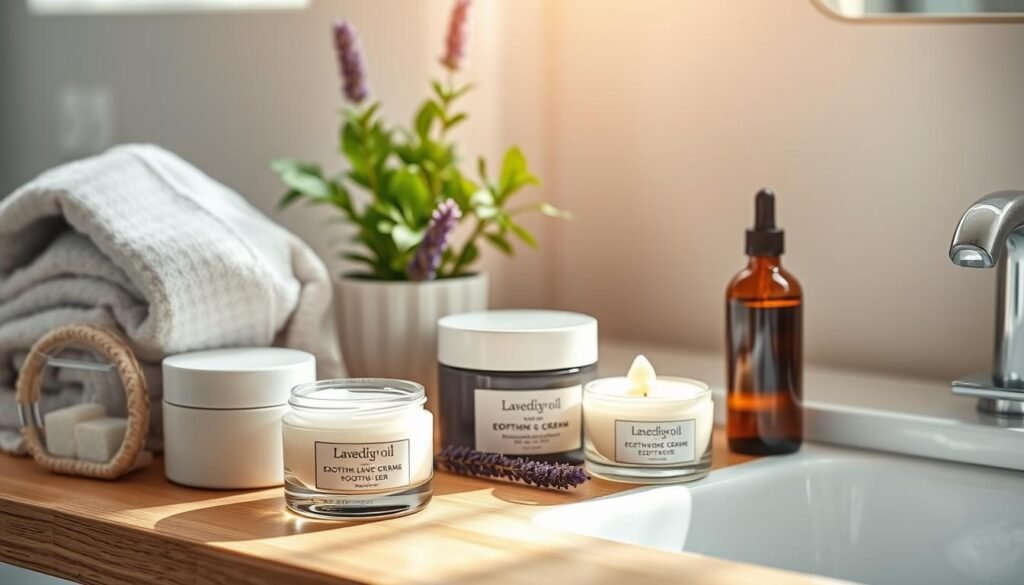Did you know over 30 million Americans deal with eczema? Many struggle with it on their necks. This condition causes an itchy rash that’s both annoying and upsetting. It’s key to learn how to handle eczema on the neck. Thankfully, new treatments and over-the-counter (OTC) remedies offer fast relief.
Identifying triggers and practicing good self-care helps lessen redness and itchiness. This piece will cover how to manage symptoms. We’ll look at OTC hydrocortisone creams and the need for moisturizing sensitive skin. For more tips on effective treatments, see over-the-counter options for eczema relief. We will explore detailed methods to fight against eczema.
Key Takeaways
- Eczema on neck is a common issue linked to various skin inflammation triggers.
- Over-the-counter medications like hydrocortisone can provide quick relief for itchy rashes.
- Identifying and avoiding allergens is crucial for managing eczema flare-ups.
- Consistent self-care practices contribute significantly to long-term management.
- Understanding the individual nature of eczema symptoms ensures personalized treatment approaches.
Understanding Eczema and Its Symptoms
Eczema causes skin inflammation and discomfort. It appears differently on people, often as a dermatitis rash with red, itchy patches. Knowing about eczema is key, especially for sensitive areas like the neck.
What is Eczema?
Eczema or atopic dermatitis impacts millions. Over 31 million Americans have it. Things like pollen or pet dander can make it worse.
The skin on the face and neck is thin. So, it gets irritated more easily, especially by strong creams.
Common Symptoms of Eczema
It’s important to know the symptoms of eczema for good treatment. Symptoms often include:
- Redness and swelling
- Itchy rash that may become dry
- Possible oozing or crusting in severe cases
- Increased sensitivity around the affected areas
People with allergy symptoms may see these signs more. Knowing these can help plan good skin care. Keeping skin moist and using the right products helps a lot. For more information on dealing with eczema, check out this resource on eczema.
Identifying Triggers for Eczema on Neck
Knowing what causes eczema is key to controlling it. Triggers differ greatly among people. Things like common allergens and irritants can cause eczema to flare up. Recognizing these can help in creating a better skincare routine.
Common Allergens and Irritants
Many individuals react to various materials and products. Some common allergens are:
- Specific fabrics that may irritate sensitive skin
- Certain skincare products containing harsh chemicals
- Environmental factors like pollen and smoke
Being exposed to these things can make eczema worse. Knowing your eczema triggers helps in preventing outbreaks, especially on the neck. If your family has a history of eczema, you might be more sensitive to these triggers.
Understanding Contact Dermatitis
Contact dermatitis happens when your skin reacts badly to something irritating or allergenic. It looks like red, itchy patches, making eczema worse. Knowing what irritates your skin helps you choose products and environments wisely. Common irritants include:
- Toxic chemicals in cleaning agents
- Fragrances in personal care items
- Metals like nickel and chromium
Avoiding these irritants can help in preventing eczema flare-ups. Preventative actions can soothe symptoms and better skin health. To learn more about managing eczema, check this resource.
Effective Home Remedies for Eczema on Neck
Dealing with eczema symptoms often means using simple home remedies. These methods ease itching and help your skin stay healthy. Many people find these remedies helpful in their eczema care.
Cool Compresses
Cool compresses are a quick fix for inflamed, itchy skin. They reduce swelling and can be used many times a day. Just soak a cloth in cold water, squeeze out the excess, and lay it on your skin. This cooling effect soothes itching and calms the skin.
Oatmeal Baths for Relief
Oatmeal baths are great for eczema relief. Colloidal oatmeal moisturizes skin and reduces inflammation. A warm oatmeal bath can make your skin feel better and less irritated. Try soaking in lukewarm water with finely ground oatmeal for 15-20 minutes to get the best results.
Apple Cider Vinegar Treatments
Apple cider vinegar is a common remedy for skin issues like eczema. It balances your skin’s pH, which may lessen eczema flare-ups. Always mix apple cider vinegar with water before using it to avoid irritation. A mix of one part vinegar to three parts water works well for baths or direct application.
These remedies are good for both adults and babies with eczema. Using them regularly can improve your skin’s health and make you more comfortable. They are a safe way to care for skin affected by eczema.
Topical Treatments for Quick Relief
Topical treatments provide immediate help for eczema. They include hydrocortisone cream and moisturizing lotions. These products improve the skin’s condition.
Hydrocortisone Cream
Hydrocortisone cream is a well-known option for easing eczema. It reduces redness and itchiness effectively. Usually, it’s used for a short time, up to a week, up to four times daily. People using it should watch out for possible side effects like dry skin.
Moisturizing Creams and Lotions
Moisturizing lotions are key for keeping skin hydrated. They are especially good for eczema care. Using products with lots of oil, like shea butter, helps lock in moisture. This can stop eczema from getting worse and calms irritated skin.
Alternative Ingredients to Consider
There are new ingredients for treating eczema. These include creams with CBD, natural oils, or manuka honey. These can help relieve eczema symptoms. Also, moisturizers that fix the skin’s barrier could protect against irritants.

Bathing Practices to Soothe Eczema Symptoms
Effective bathing habits can really help with eczema. Keeping skin moist is key through the right shower routine. This means regular showers and soaking baths to lessen pain and aid healing.
Proper Showering Techniques
For people with eczema, changing their shower habits helps. Use lukewarm water instead of hot to keep skin oils. A good routine includes:
- Taking showers for no longer than 10 to 15 minutes.
- Using gentle, fragrance-free cleansers.
- Moisturizing immediately after showering to lock in hydration.
- Opting for high-oil content moisturizers applied while the skin is still damp.
Soaking in Colloidal Oatmeal
Soaking baths with colloidal oatmeal calm skin. Colloidal oatmeal helps by:
- Reducing itching and irritation.
- Repairing the skin barrier.
- Moisturizing the skin naturally during baths.
Just add colloidal oatmeal to warm bath water and soak for 10 to 15 minutes. This boosts hydration and reduces discomfort. Adopting these bathing methods can lead to healthier skin and better health overall.
Diet and Nutrition’s Role in Eczema Management
Nutrition is key in managing eczema. Both what you eat and potential food allergies can greatly affect eczema. Focusing on your diet helps. You might find comfort by eating anti-inflammatory foods and taking certain supplements. It’s important to tailor food choices to your allergies and reactions.
Anti-inflammatory Foods
Food rich in anti-inflammatory properties help your skin. They lessen eczema symptoms. Here are some:
- Fruits and veggies full of antioxidants, like berries and greens.
- Healthy fats, especially omega-3s in fish such as salmon and herring.
- Nuts and seeds, packed with nutrients to fight inflammation.
- Legumes, offering plant proteins for health.
- Whole grains, like brown rice and quinoa, for digestive wellness.
A Mediterranean diet may improve eczema for some. It focuses on whole foods and lean protein, with less processed food.
Supplements that May Help
Certain supplements might support eczema management:
- Omega-3 fatty acids can help with inflammation.
- Vitamin D is crucial for the immune system.
- Zinc supports skin repair and overall health.
- Probiotics might boost the immune system for some eczema sufferers, though opinions vary.
Supplements may help with eczema, but results differ from person to person. Always talk to a doctor before trying new supplements.

Choosing the Right Fabrics and Clothing
When you have sensitive skin from eczema, it’s crucial to pick the right clothes. What you wear can affect your skin—either by making it worse or helping it feel better. Knowing which fabrics are softest can make a big difference in your comfort and prevent eczema flare-ups.
Best Fabrics for Sensitive Skin
For those dealing with eczema, certain fabrics are more comfortable:
- Cotton: Soft, breathable, and good at letting moisture evaporate. It’s a top choice for sensitive skin.
- Silk: It’s smooth and less likely to irritate, but it’s hard to wash.
- Bamboo: Bamboo is soft and great at keeping you cool and comfortable.
- Lyocell (TENCEL): This is eco-friendly and good for sensitive skin because it fights microbes.
Avoiding Irritating Materials
To manage eczema better, avoid materials that could cause problems:
- Wool: Its rough fibers may lead to irritation and are not comfortable for sensitive skin.
- Synthetic fabrics: Fabrics like polyester and nylon trap heat and moisture, which can irritate your skin.
- Harsh dyes: Dark-colored clothes often have harmful chemicals that can cause allergic reactions.
- Embellishments: Pieces like zippers and buttons, if made from nickel, can worsen sensitive skin.
Choosing the right fabrics for eczema can majorly boost comfort and protect your skin. By picking clothes wisely, people with eczema can live more comfortably. This way, they lessen the chance of skin irritation and maintain healthier skin.
| Fabric Type | Benefits | Considerations |
|---|---|---|
| Cotton | Soft, breathable, moisture-wicking | Ensure it is 100% cotton without blends |
| Silk | Smooth, breathable, low friction | Non-washable, may irritate if not kept clean |
| Bamboo | Soft, absorbent, breathable | Check for processing methods to avoid harmful chemicals |
| TENCEL | Eco-friendly, antimicrobial, soft | Ensure it’s paired with safe dyes and processes |
| Wool | Natural insulation | Can irritate sensitive skin, especially coarse types |
Stress Management Techniques for Eczema Sufferers
Managing stress is key to controlling eczema. Knowing how to relieve stress helps lessen eczema outbreaks and boosts well-being. Stress often triggers eczema, affecting both genders. To fight this, adding relaxation and physical activities to daily life is helpful.
Practicing Relaxation Techniques
Relaxation methods like yoga, mindfulness, and meditation are vital for stress control. These activities bring relaxation and may lower skin inflammation from eczema. They calm the mind and aid skin self-repair. Knowing what stresses you and avoiding it is crucial for balance.
Finding enjoyable activities and getting support from family or eczema groups promotes emotional health. It’s about creating happiness and getting the right support.
Physical Activity and Its Benefits
Exercise is great for mental health and stress relief. Walking, swimming, or biking boosts mood and eases anxiety. Exercise also benefits skin health and can lessen eczema episodes. A regular workout routine uses the body’s stress relief system and builds stress resilience.
Good sleep is also essential for stress management. It shows the link between a healthy lifestyle and managing eczema well. Furthermore, getting enough rest helps keep stress low, which is crucial for controlling eczema.

For more on stress relief and eczema management, check out this resource.
Consulting Healthcare Professionals
It’s vital to get a medical consultation for ongoing or worsening eczema issues. Knowing when to contact healthcare experts can improve condition management.
When to Seek Medical Help
Should home remedies and store-bought options fail, it’s time to seek professional help. Key symptoms signaling the need for a consultation include:
- Intense itching that interrupts daily life
- Skin infections or infection indicators like swelling and pus
- Continual red or inflamed skin that doesn’t get better
- Deteriorating symptoms despite treatment efforts
Possible Prescription Treatments
Effective eczema treatment often requires prescription medication. Doctors might recommend various options, such as:
| Medication Type | Description |
|---|---|
| Corticosteroids | They’re anti-inflammatory creams to lessen swelling and redness. |
| Topical Calcineurin Inhibitors | These are non-steroid creams that lower skin’s immune response. |
| Biologics | They’re used for moderate to severe eczema, as targeted therapies. |
Talking with dermatologists or allergists can create tailored and effective treatment plans. For tips on finding the right specialist for eczema, check out this resource. It’s wise to get help early for the best results, especially when usual approaches don’t work. For more help on easing itchiness, see the advice on itch relief techniques.
Conclusion
Understanding eczema, especially when it shows up on the neck, is key for handling it well. Eczema affects 15% to 30% of kids and 2% to 10% of adults in their lifetime. Knowing the signs and what causes flare-ups is crucial to get the right help and comfort.
There are many ways to reduce discomfort and improve skin health. Using cool compresses and taking oatmeal baths are great at home. Applying creams like hydrocortisone can also help. Making changes in what you eat and wearing suitable clothes can greatly reduce eczema flare-ups.
To manage eczema well, you need to use different treatments and care practices together. These methods can help someone with eczema live a better life with healthier skin. They can win against the struggles this condition brings.